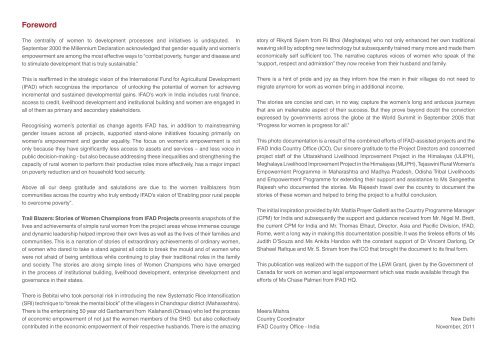Trail Blazers - IFAD
Trail Blazers - IFAD
Trail Blazers - IFAD
You also want an ePaper? Increase the reach of your titles
YUMPU automatically turns print PDFs into web optimized ePapers that Google loves.
Foreword<br />
The centrality of women to development processes and initiatives is undisputed. In<br />
September 2000 the Millennium Declaration acknowledged that gender equality and women’s<br />
empowerment are among the most effective ways to “combat poverty, hunger and disease and<br />
to stimulate development that is truly sustainable.”<br />
story of Rikynti Syiem from Ri Bhoi (Meghalaya) who not only enhanced her own traditional<br />
weaving skill by adopting new technology but subsequently trained many more and made them<br />
economically self sufficient too. The narrative captures voices of women who speak of the<br />
“support, respect and admiration” they now receive from their husband and family.<br />
This is reaffirmed in the strategic vision of the International Fund for Agricultural Development<br />
(<strong>IFAD</strong>) which recognizes the importance of unlocking the potential of women for achieving<br />
incremental and sustained developmental gains. <strong>IFAD</strong>’s work in India includes rural finance,<br />
access to credit, livelihood development and institutional building and women are engaged in<br />
all of them as primary and secondary stakeholders.<br />
Recognising women’s potential as change agents <strong>IFAD</strong> has, in addition to mainstreaming<br />
gender issues across all projects, supported stand-alone initiatives focusing primarily on<br />
women’s empowerment and gender equality. The focus on women’s empowerment is not<br />
only because they have significantly less access to assets and services – and less voice in<br />
public decision-making - but also because addressing these inequalities and strengthening the<br />
capacity of rural women to perform their productive roles more effectively, has a major impact<br />
on poverty reduction and on household food security.<br />
Above all our deep gratitude and salutations are due to the women trailblazers from<br />
communities across the country who truly embody <strong>IFAD</strong>’s vision of ‘Enabling poor rural people<br />
to overcome poverty”.<br />
<strong>Trail</strong> <strong>Blazers</strong>: Stories of Women Champions from <strong>IFAD</strong> Projects presents snapshots of the<br />
lives and achievements of simple rural women from the project areas whose immense courage<br />
and dynamic leadership helped improve their own lives as well as the lives of their families and<br />
communities. This is a narration of stories of extraordinary achievements of ordinary women,<br />
of women who dared to take a stand against all odds to break the mould and of women who<br />
were not afraid of being ambitious while continuing to play their traditional roles in the family<br />
and society. The stories are along simple lines of Women Champions who have emerged<br />
in the process of institutional building, livelihood development, enterprise development and<br />
governance in their states.<br />
There is a hint of pride and joy as they inform how the men in their villages do not need to<br />
migrate anymore for work as women bring in additional income.<br />
The stories are concise and can, in no way, capture the women’s long and arduous journeys<br />
that are an inalienable aspect of their success. But they prove beyond doubt the conviction<br />
expressed by governments across the globe at the World Summit in September 2005 that<br />
“Progress for women is progress for all.”<br />
This photo documentation is a result of the combined efforts of <strong>IFAD</strong>-assisted projects and the<br />
<strong>IFAD</strong> India Country Office (ICO). Our sincere gratitude to the Project Directors and concerned<br />
project staff of the Uttarakhand Livelihood Improvement Project in the Himalayas (ULIPH),<br />
Meghalaya Livelihood Improvement Project in the Himalayas (MLIPH), Tejaswini Rural Women’s<br />
Empowerment Programme in Maharashtra and Madhya Pradesh, Odisha Tribal Livelihoods<br />
and Empowerment Programme for extending their support and assistance to Ms Sangeetha<br />
Rajeesh who documented the stories. Ms Rajeesh travel over the country to document the<br />
stories of these women and helped to bring the project to a fruitful conclusion.<br />
The initial inspiration provided by Mr. Mattia Prayer Galletti as the Country Programme Manager<br />
(CPM) for India and subsequently the support and guidance received from Mr. Nigel M. Brett,<br />
the current CPM for India and Mr. Thomas Elhaut, Director, Asia and Pacific Division, <strong>IFAD</strong>,<br />
Rome, went a long way in making this documentation possible. It was the tireless efforts of Ms<br />
Judith D’Souza and Ms Ankita Handoo with the constant support of Dr Vincent Darlong, Dr<br />
Shaheel Rafique and Mr. S. Sriram from the ICO that brought the document to its final form.<br />
This publication was realized with the support of the LEWI Grant, given by the Government of<br />
Canada for work on women and legal empowerment which was made available through the<br />
efforts of Ms Chase Palmeri from <strong>IFAD</strong> HQ.<br />
There is Bebitai who took personal risk in introducing the new Systematic Rice Intensification<br />
(SRI) technique to “break the mental block” of the villagers in Chandrapur district (Maharashtra).<br />
There is the enterprising 50 year old Garibamani from Kalahandi (Orissa) who led the process<br />
of economic empowerment of not just the women members of the SHG but also collectively<br />
contributed in the economic empowerment of their respective husbands. There is the amazing<br />
Meera Mishra<br />
Country Coordinator<br />
<strong>IFAD</strong> Country Office - India<br />
New Delhi<br />
November, 2011

















